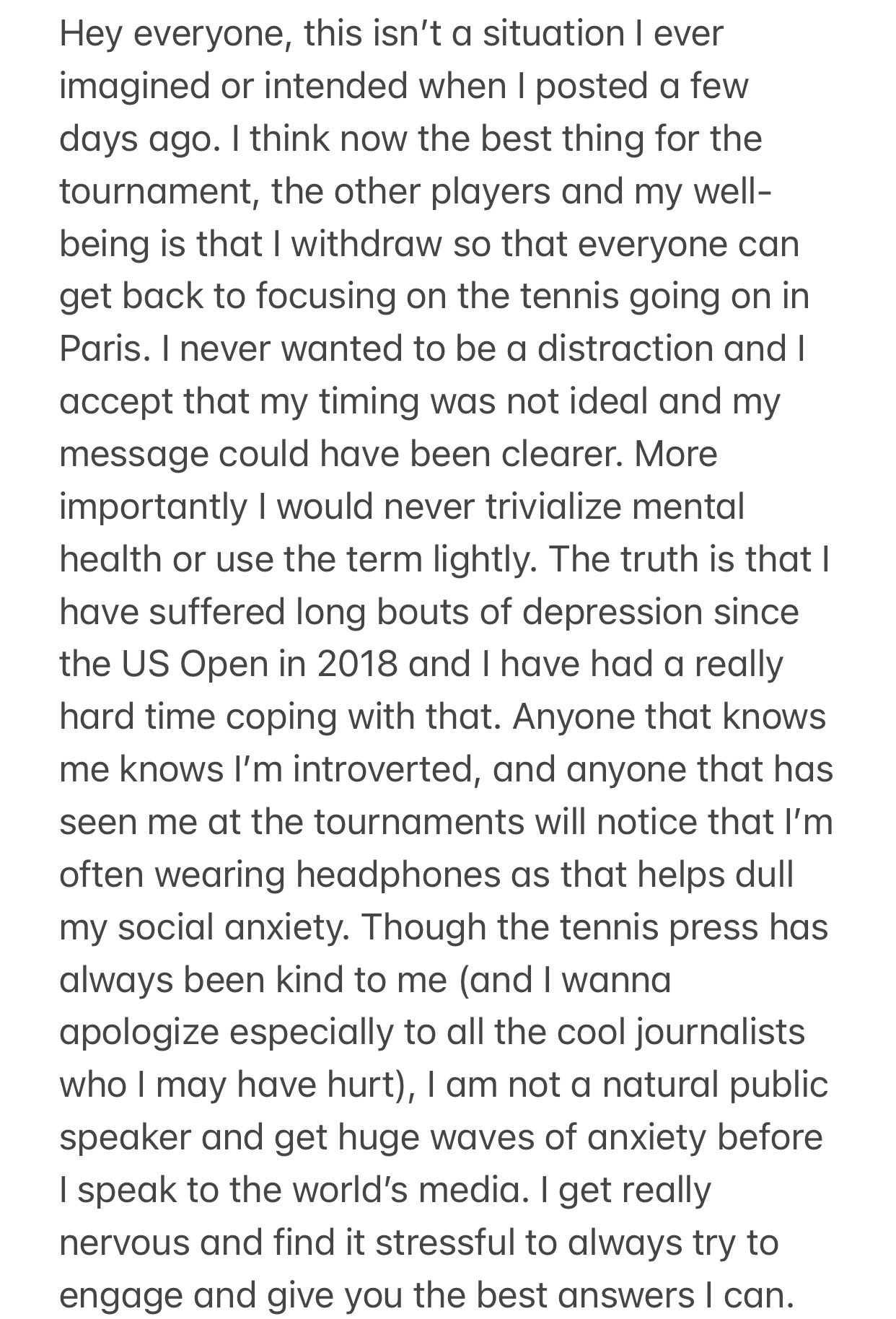That's in part being a member of the media, who has at the local level, seen in person politicos and businessmen trying to stiff the media, and seeing those same folks — AND athletes and other entertainers — pull the same nationally and globally.
In general, and definitely with Osaka in person, it all boils down to communication, or apparent lack thereof on her part, AND her willing choices made in all of this.
First, let us remember that she won the Australian Open. I don't remember her expressing that much angst during or after matches in Melbourne, or after the whole open were done, about being interviewed. She did admit to being "funny" and "nervous" in the interview after winning the final there. See below.
Second, let us note that if she DID have any such problems that she kept private, she's had nearly 3 1/2 months to communicate with the folks at Roland Garros.
She chose not to.
Instead, just days before the start of action, she dropped a bombshell social media statement with a blanket "no interviews." Note that she wouldn't give any interviews about that statement, either.
The folks in Paris said they reached out to her and got crickets, acting on behalf of all four Grand Slams. It was only after that reach-out was snubbed that a further warning was issued saying fines could escalate and that even a disqualification was possible. Given all the above, for Red Satan's author to call this surprising is laughable, naive or worse. The statement within that link says these are normal escalating enforcement provisions within normal Code of Conduct regulations.
Her personal withdrawal statement was also? Posted on her social media. No interview afterward. No returning of questions by the Associated Press.
She DID claim, hypocritically in my opinion, that she NOW wanted to talk with the Grand Slam organizations. Maybe this was because they'd fully indicated that a conversation, not a set of social media posts, needed to happen, that it would happen as a conversation, and not on unilateral terms.
That's probably part of what she didn't imagine a few days ago.
As for other aspects of her withdrawal statement?
First, introversion is not a mental health issue, and it's insulting of her to call it one. It's also sad if she really believes that about introversion in herself.
And (see links below) her desire to market herself as a brand? Introversion is not shyness.
And now, to tennis as a business.
The Roland Garros statement notes contractual obligations. That's the bottom line. This is a business, and a big one.
Though, as of 2019, not as big as Osaka's endorsement money.
Someone on Twitter suggested the tradeoff of "no interviews, fewer endorsements." Sounds great in practice, but how do you enforce it in reality? In the US, it would run afoul of the First Amendment, especially on individual sports with no team owners to enforce discipline.
Next, to tie that back to her statement? I'm sure Osaka has done marketing interviews related to some of her endorsements, like this big one for Levi's.
Next, to the sports media she first complained about, but pulled in her horns on her withdrawal statement.
Yes, there's inane questions there. Anybody who's watch the full press day at the Super Bowl knows that, too.
But, there's real questions, too. Like at the PGA, to go to golf, asking Brooks Koepka after Round 4, if anybody did, if he's thought that he's lost some of his "majors aura."
OR, with the interview after the Aussie final, Osaka being asked about different court surfaces for upcoming Grand Slams and other events.
Yes, that interview was long, but normally, before the quarters level at a Slam, press availability time is 5-5 minutes, no more.
Could this be further shortened at the quarters, semis, and finals? Yes? Beyond inanity, does sports media have its version of Jim Acosta? Yes. Plenty of them.
Again, though, Osaka has had 3 1/2 months to raise this. And chose not to.
When she actually starts talking with the Slams, she needs to include an on-the-record explanation of why the wait.
==
Update: Per CJR, some people are saying that under the Americans with Disabilities Act, she's owed a reasonable accommodation.
Well, there's several things to unpack here.
The French clay of Roland Garros ain't in America, first. Neither is the grass of the All England Tennis Club nor the composite surface of Melbourne, Australia.
Second, even in the US, what would a reasonable accommodation be?
Third, what is the line between responsibility and obligation, Jon Allsop asks in that piece. He tangentially touches on business aspects but not too directly.
==
Update, June 7: Osaka has a funny way of wanting to talk to the Grand Slams. She's withdrawn from a "Wimbledon tune-up" tourney in Berlin and her appearance at Wimbledon is doubtful.
Update, June 13: Roland Garros makes clear how they reached out to Osaka, repeatedly, and heard nothing (and apparently continue to hear nothing, per the update above).


No comments:
Post a Comment